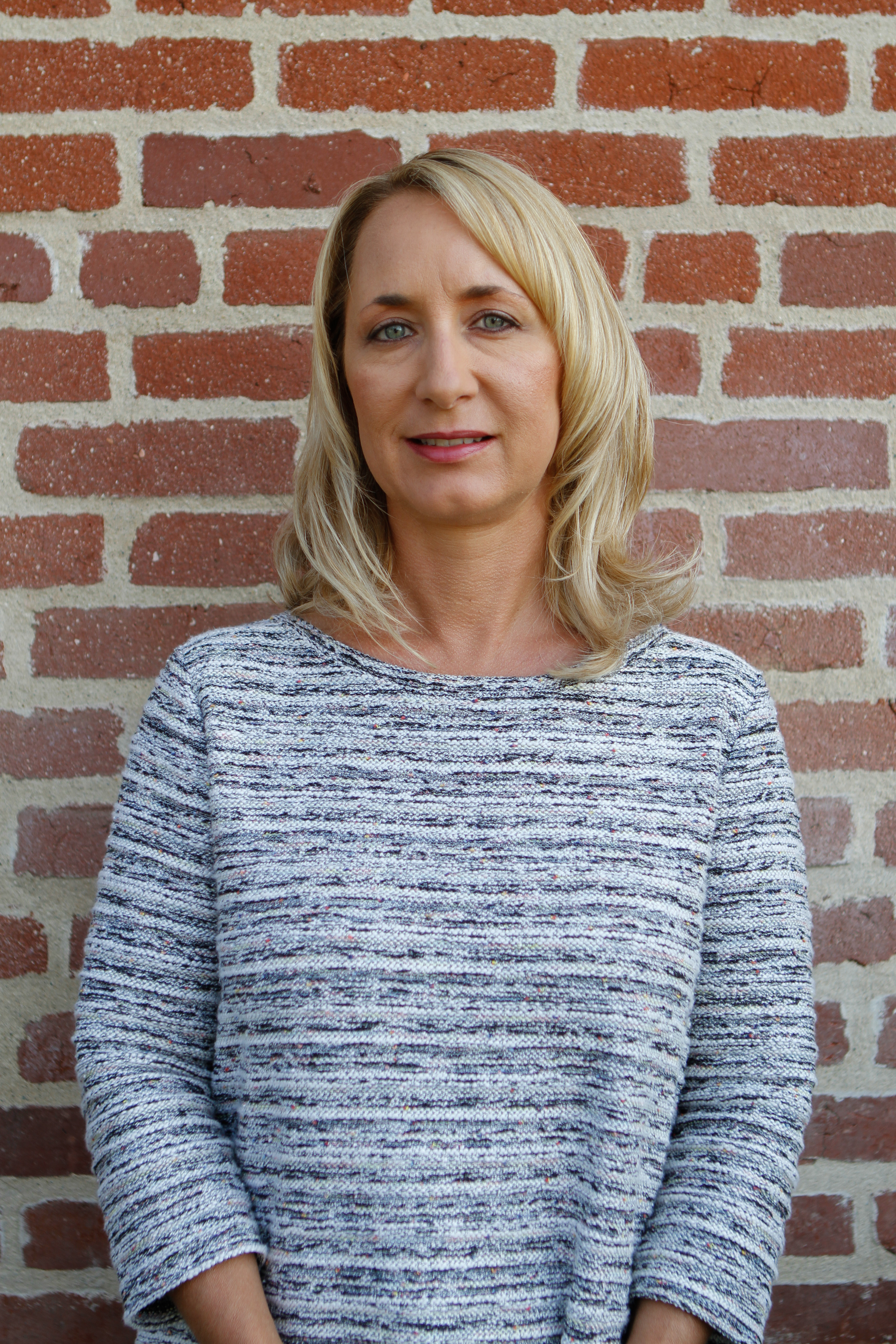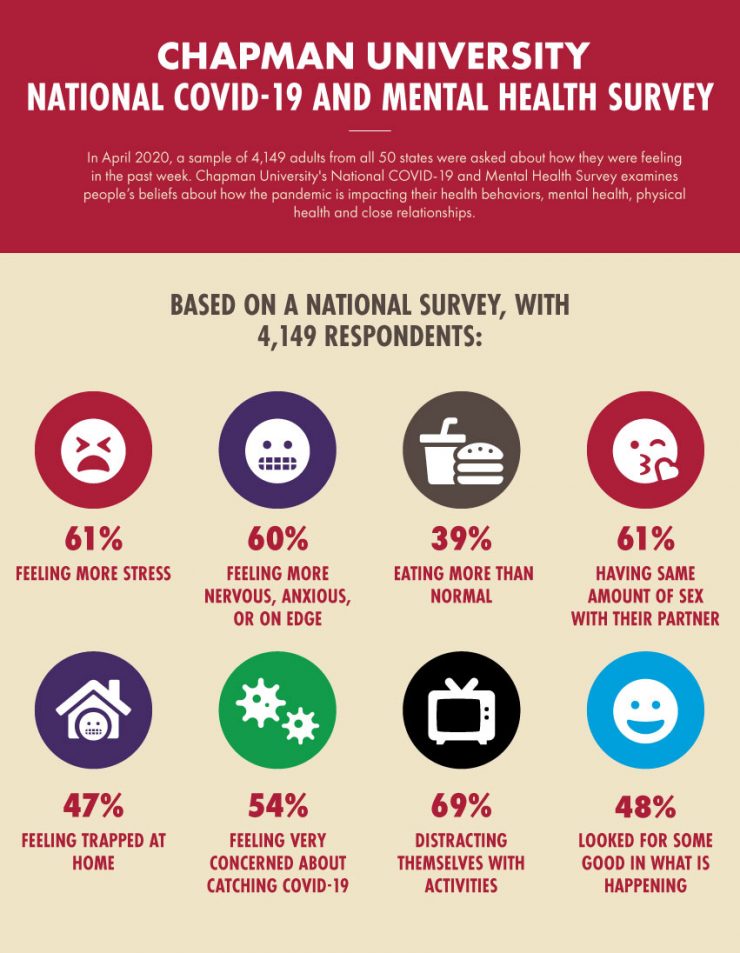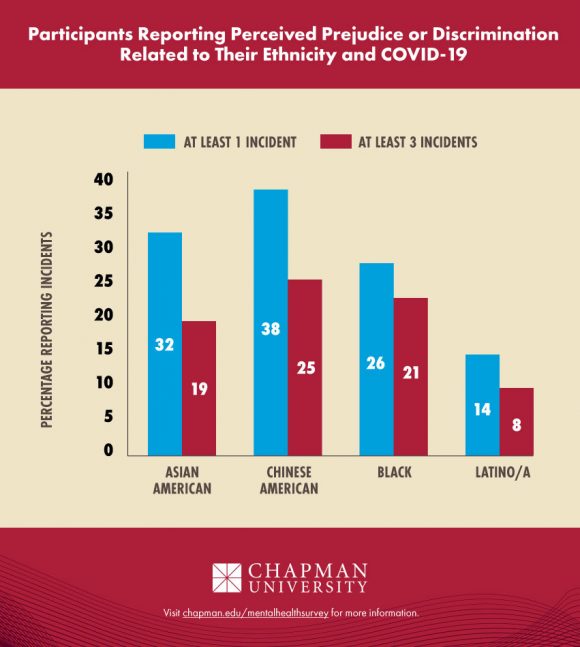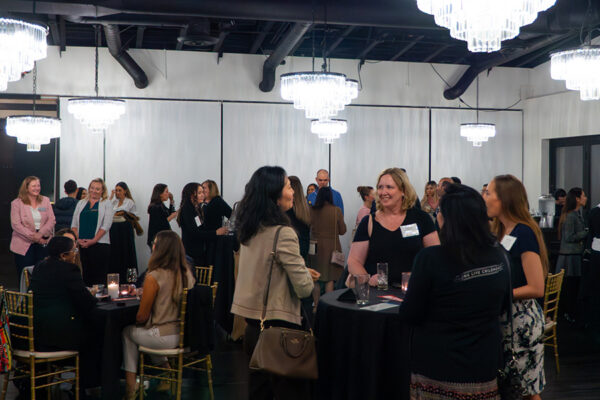If you’re feeling frazzled by the COVID-19 pandemic, you are far from alone. A new Chapman University study finds that 61% of respondents are experiencing high levels of stress, with 45% reporting that they “feel down, depressed or hopeless.”
For many Americans, the response is to eat more junk food (41%), exercise less (35%) and seek out the distractions of TV, gardening and hobbies (69%), the study finds. Fifty-four percent say they are very concerned about catching COVID-19, while only 17% contend that concerns about the virus are “overblown.”

These are just some of the results from the Spring 2020 Chapman University National COVID-19 and Mental Health Survey, led by principal investigator David Frederick, Ph.D., an associate professor of health psychology in Chapman’s Crean College of Health and Behavioral Sciences. Joining in the research project as co-authors are 11 members of the Chapman University Center for Excellence in Biopsychosocial Approaches to Health.
The study, which compiles and evaluates results from an online survey, was funded by a grant from the Kay Family Foundation. As principal investigator, Frederick leverages considerable experience conducting large-scale national surveys, many of which link current events to human behavior. The project features a nationally prominent team with a diverse array of research interests. Included are Georgiana Bostean, an associate professor of environment health and policy who explores population health disparities, and Amy Moors, an assistant professor of psychology and a research fellow at the Kinsey Institute.
“We’ve been hearing lots of reports that people are depressed or anxious over what’s happening, and as research scientists we want to know the data behind that,” Frederick says of the study, which examined the experiences of 4,149 people living in the U.S. “What are people experiencing, and how prevalent are the harms?”
Beyond mental and physical health, the study looks at the impact of the virus on romantic relationships as well as whether ethnic minorities are experiencing prejudice and discrimination because of perceived connections to the spread of COVID-19.
Racial Findings Stand Out
The findings that relate to ethnicity are particularly significant, Frederick says. Thirty-eight percent of Chinese Americans and 32% of Asian Americans report experiencing at least one racist incident they perceive as connected to the pandemic. One-fourth of the Chinese Americans surveyed say they have experienced three or more racist incidents.
What’s more, 18% of Black respondents say they’ve been physically threatened. An equal percentage have been told “Go back to your country” or that they don’t belong in the U.S.
“This surprised us, but maybe it shouldn’t have,” Frederick says. “They’re one of the hardest-hit groups in terms of mortality and contracting coronavirus, so perhaps it shouldn’t be surprising that they’re also being discriminated against or perceiving prejudice.”
On the relationship front, 64% of participants say they are spending more time with their partner, with about an equal percentage reporting more arguments (25%) versus fewer arguments (23%) than normal.

For 45% of respondents, the pandemic sparks feelings of being “trapped at home.” Thirty-six percent say they have received comfort and understanding from someone, while 31% say they find comfort in their religion or spiritual beliefs. Forty-eight percent have “looked for something good in what is happening.”
“How people cope in times of stress is very important,” says Brooke Jenkins, Ph.D., a health psychologist at Chapman and one of the study’s authors. “When stress is more outside of our control, techniques like distraction and reappraisal are beneficial. For example, if you feel that you have to stay home, and that is outside of your control, then engaging in distracting activities like TV, gardening and exercise can be quite helpful.”
Looking for benefits is also important, Jenkins adds.
“When stress seems more controllable, it’s great to engage in active coping,” she says. “For example, if you feel that you can actively reduce your risk of exposure to COVID-19, then getting advice from others and taking action to improve your situation will likely be helpful.”
What are the most effective methods of coping?
“In our study, people who ‘took action to make their situation better’ and who ‘looked for something good in what is happening’ reported the best mental health,” Frederick says.
By contrast, people who gave up trying to deal with the pandemic, used drugs or alcohol, or “said things to let my unpleasant feelings escape” tended to have poorer mental health, Frederick notes.

“There is no single strategy that will be optimal for coping with all of the stresses,” says Tara Gruenewald, Ph.D., a project co-investigator who studies mental health. “A good rule of thumb is to gravitate toward those forms of healthy stress management you normally engage in, whether that is exercise, a good book, a favorite hobby, meditation or connecting with others. Of course, being safe and avoiding infection means we have to alter the way we engage in these activities, but the important thing is to make time to do them.”
The research project continues as the authors recruit additional participants and follow current respondents over time. Those interested in completing the “Personal Attitudes and Experiences Studies” survey will be entered into a lottery for a $250 stipend.






